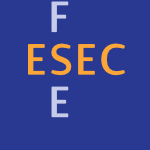225 papers:
 FoSSaCS-2015-SalvatiW #type system
FoSSaCS-2015-SalvatiW #type system- Typing Weak MSOL Properties (SS, IW), pp. 343–357.
 SCAM-2015-RenatusBE #modelling #security #using
SCAM-2015-RenatusBE #modelling #security #using- Improving prioritization of software weaknesses using security models with AVUS (SR, CB, JE), pp. 259–264.
 PLDI-2015-TassarottiDV #logic #memory management #verification
PLDI-2015-TassarottiDV #logic #memory management #verification- Verifying read-copy-update in a logic for weak memory (JT, DD, VV), pp. 110–120.
 ICALP-v2-2015-LahavV #memory management #modelling #reasoning
ICALP-v2-2015-LahavV #memory management #modelling #reasoning- Owicki-Gries Reasoning for Weak Memory Models (OL, VV), pp. 311–323.
 LATA-2015-Cotton-BarrattMO #automaton #memory management
LATA-2015-Cotton-BarrattMO #automaton #memory management- Weak and Nested Class Memory Automata (CCB, ASM, CHLO), pp. 188–199.
 FM-2015-DerrickS #correctness #framework #memory management #modelling
FM-2015-DerrickS #correctness #framework #memory management #modelling- A Framework for Correctness Criteria on Weak Memory Models (JD, GS), pp. 178–194.
 QAPL-2015-AldiniB #automaton #markov #similarity
QAPL-2015-AldiniB #automaton #markov #similarity- Expected-Delay-Summing Weak Bisimilarity for Markov Automata (AA, MB), pp. 1–15.
 ASPLOS-2015-AlglaveBDGKPSW #behaviour #concurrent #gpu #programming
ASPLOS-2015-AlglaveBDGKPSW #behaviour #concurrent #gpu #programming- GPU Concurrency: Weak Behaviours and Programming Assumptions (JA, MB, AFD, GG, JK, DP, TS, JW), pp. 577–591.
 HPDC-2015-WangZQLMR #consistency #distributed #scalability #towards
HPDC-2015-WangZQLMR #consistency #distributed #scalability #towards- Towards Scalable Distributed Workload Manager with Monitoring-Based Weakly Consistent Resource Stealing (KW, XZ, KQ, ML, BM, IR), pp. 219–222.
 CADE-2015-SakaiOO #confluence
CADE-2015-SakaiOO #confluence- Non-E-Overlapping, Weakly Shallow, and Non-Collapsing TRSs are Confluent (MS, MO, MO), pp. 111–126.
 CSL-2015-BrihayeBMR #reachability
CSL-2015-BrihayeBMR #reachability- Weak Subgame Perfect Equilibria and their Application to Quantitative Reachability (TB, VB, NM, JFR), pp. 504–518.
 ICLP-J-2015-LawRB #constraints #learning #programming #set
ICLP-J-2015-LawRB #constraints #learning #programming #set- Learning weak constraints in answer set programming (ML, AR, KB), pp. 511–525.
 LICS-2015-Carreiro #bisimulation #invariant #logic
LICS-2015-Carreiro #bisimulation #invariant #logic- PDL Is the Bisimulation-Invariant Fragment of Weak Chain Logic (FC), pp. 341–352.
 WRLA-2014-LucasM #order #termination
WRLA-2014-LucasM #order #termination- Strong and Weak Operational Termination of Order-Sorted Rewrite Theories (SL, JM), pp. 178–194.
 PLDI-2014-AlglaveMT #memory management #modelling #simulation #testing
PLDI-2014-AlglaveMT #memory management #modelling #simulation #testing- Herding cats: modelling, simulation, testing, and data-mining for weak memory (JA, LM, MT), p. 7.
 STOC-2014-Massoulie #community #detection
STOC-2014-Massoulie #community #detection- Community detection thresholds and the weak Ramanujan property (LM), pp. 694–703.
 ICALP-v1-2014-AaronsonABB
ICALP-v1-2014-AaronsonABB- Weak Parity (SA, AA, KB, MB), pp. 26–38.
 ICALP-v2-2014-Bojanczyk14a #infinity #quantifier
ICALP-v2-2014-Bojanczyk14a #infinity #quantifier- Weak MSO+U with Path Quantifiers over Infinite Trees (MB), pp. 38–49.
 ICALP-v2-2014-Chatterjee0 #game studies
ICALP-v2-2014-Chatterjee0 #game studies- Games with a Weak Adversary (KC, LD), pp. 110–121.
 ICALP-v2-2014-GoncharovP #algebra #bisimulation #equation #monad #recursion
ICALP-v2-2014-GoncharovP #algebra #bisimulation #equation #monad #recursion- Coalgebraic Weak Bisimulation from Recursive Equations over Monads (SG, DP), pp. 196–207.
 ICML-c2-2014-XuTXR #reduction
ICML-c2-2014-XuTXR #reduction- Large-margin Weakly Supervised Dimensionality Reduction (CX, DT, CX, YR), pp. 865–873.
 KDD-2014-LiuWY #algorithm #performance
KDD-2014-LiuWY #algorithm #performance- An efficient algorithm for weak hierarchical lasso (YL, JW, JY), pp. 283–292.
 SIGIR-2014-HingmireC #approach #classification #topic
SIGIR-2014-HingmireC #approach #classification #topic- Topic labeled text classification: a weakly supervised approach (SH, SC), pp. 385–394.
 OOPSLA-2014-TuronVD #memory management #named #navigation #protocol
OOPSLA-2014-TuronVD #memory management #named #navigation #protocol- GPS: navigating weak memory with ghosts, protocols, and separation (AT, VV, DD), pp. 691–707.
 SAC-2014-OmatuY #classification #smell #using
SAC-2014-OmatuY #classification #smell #using- Smell classification using weakly responding data (SO, MY), pp. 213–214.
 HPCA-2014-PariharH #approach #dependence #metaheuristic
HPCA-2014-PariharH #approach #dependence #metaheuristic- Accelerating decoupled look-ahead via weak dependence removal: A metaheuristic approach (RP, MCH), pp. 662–677.
 LICS-CSL-2014-CarreiroFVZ #automaton #similarity
LICS-CSL-2014-CarreiroFVZ #automaton #similarity- Weak MSO: automata and expressiveness modulo bisimilarity (FC, AF, YV, FZ), p. 27.
 LICS-CSL-2014-CharatonikKM #decidability #logic #transitive
LICS-CSL-2014-CharatonikKM #decidability #logic #transitive- Decidability of weak logics with deterministic transitive closure (WC, EK, FM), p. 10.
 LICS-CSL-2014-Haase #subclass
LICS-CSL-2014-Haase #subclass- Subclasses of presburger arithmetic and the weak EXP hierarchy (CH), p. 10.
 SMT-2014-ChristH #array
SMT-2014-ChristH #array- Weakly Equivalent Arrays (JC, JH), pp. 39–49.
 ICDAR-2013-RoySSJ #documentation #n-gram #segmentation #using
ICDAR-2013-RoySSJ #documentation #n-gram #segmentation #using- Character N-Gram Spotting on Handwritten Documents Using Weakly-Supervised Segmentation (UR, NS, KPS, CVJ), pp. 577–581.
 ESOP-2013-AlglaveKNT #memory management #program transformation #verification
ESOP-2013-AlglaveKNT #memory management #program transformation #verification- Software Verification for Weak Memory via Program Transformation (JA, DK, VN, MT), pp. 512–532.
 ESOP-2013-JagadeesanPPR #composition #memory management #modelling #reasoning
ESOP-2013-JagadeesanPPR #composition #memory management #modelling #reasoning- Quarantining Weakness — Compositional Reasoning under Relaxed Memory Models (Extended Abstract) (RJ, GP, CP, JR), pp. 492–511.
 ICALP-v2-2013-JurdzinskiKS #distributed #network
ICALP-v2-2013-JurdzinskiKS #distributed #network- Distributed Deterministic Broadcasting in Wireless Networks of Weak Devices (TJ, DRK, GS), pp. 632–644.
 ICFP-2013-Balabonski
ICFP-2013-Balabonski- Weak optimality, and the meaning of sharing (TB), pp. 263–274.
 CSCW-2013-BurkeK #difference #facebook #using
CSCW-2013-BurkeK #difference #facebook #using- Using facebook after losing a job: differential benefits of strong and weak ties (MB, RK), pp. 1419–1430.
 CIKM-2013-FangHZ #analysis #bibliography #sentiment
CIKM-2013-FangHZ #analysis #bibliography #sentiment- Exploring weakly supervised latent sentiment explanations for aspect-level review analysis (LF, MH, XZ), pp. 1057–1066.
 SEKE-2013-Al-JamimiA #design pattern #detection #prolog #using
SEKE-2013-Al-JamimiA #design pattern #detection #prolog #using- Using Prolog Rules to Detect Software Design Patterns: Strengths and Weaknesses (S) (HAAJ, MAA), pp. 727–730.
 SIGIR-2013-BonnefoyBB #detection #documentation
SIGIR-2013-BonnefoyBB #detection #documentation- A weakly-supervised detection of entity central documents in a stream (LB, VB, PB), pp. 769–772.
 PPDP-2013-ChristiansenHRS #encapsulation #functional #logic programming #semantics #source code
PPDP-2013-ChristiansenHRS #encapsulation #functional #logic programming #semantics #source code- A semantics for weakly encapsulated search in functional logic programs (JC, MH, FR, DS), pp. 49–60.
 PPoPP-2013-LePCN #memory management #modelling #performance
PPoPP-2013-LePCN #memory management #modelling #performance- Correct and efficient work-stealing for weak memory models (NML, AP, AC, FZN), pp. 69–80.
 CADE-2013-BaumgartnerW #abstraction
CADE-2013-BaumgartnerW #abstraction- Hierarchic Superposition with Weak Abstraction (PB, UW), pp. 39–57.
 CSL-2013-ColcombetKLB #automaton
CSL-2013-ColcombetKLB #automaton- Deciding the weak definability of Büchi definable tree languages (TC, DK, CL, MVB), pp. 215–230.
 LICS-2013-HofmanMT #decidability #simulation
LICS-2013-HofmanMT #decidability #simulation- Decidability of Weak Simulation on One-Counter Nets (PH, RM, PT), pp. 203–212.
 LICS-2013-Riba #infinity #word
LICS-2013-Riba #infinity #word- Forcing MSO on Infinite Words in Weak MSO (CR), pp. 448–457.
 SAT-2013-MisraORS #bound #detection #set
SAT-2013-MisraORS #bound #detection #set- Upper and Lower Bounds for Weak Backdoor Set Detection (NM, SO, VR, SS), pp. 394–402.
 PODS-2012-Tao #2d #constant
PODS-2012-Tao #2d #constant- Indexability of 2D range search revisited: constant redundancy and weak indivisibility (YT), pp. 131–142.
 ESOP-2012-AtigBBM #decidability #memory management #modelling #question #what
ESOP-2012-AtigBBM #decidability #memory management #modelling #question #what- What’s Decidable about Weak Memory Models? (MFA, AB, SB, MM), pp. 26–46.
 ICSM-2012-QianZ #java #memory management
ICSM-2012-QianZ #java #memory management- Inferring weak references for fixing Java memory leaks (JQ, XZ), pp. 571–574.
 ICSM-2012-QiML #automation #performance #scalability #source code #using
ICSM-2012-QiML #automation #performance #scalability #source code #using- Making automatic repair for large-scale programs more efficient using weak recompilation (YQ, XM, YL), pp. 254–263.
 CIAA-2012-AmaviCR #recursion #xml
CIAA-2012-AmaviCR #recursion #xml- Weak Inclusion for Recursive XML Types (JA, JC, PR), pp. 78–89.
 LATA-2012-IbarraT #automaton #multi #turing machine
LATA-2012-IbarraT #automaton #multi #turing machine- Weak Synchronization and Synchronizability of Multitape Pushdown Automata and Turing Machines (OHI, NQT), pp. 337–350.
 CIKM-2012-LuZZX #image #learning #scalability #semantics #set
CIKM-2012-LuZZX #image #learning #scalability #semantics #set- Semantic context learning with large-scale weakly-labeled image set (YL, WZ, KZ, XX), pp. 1859–1863.
 ICML-2012-JoulinB #classification
ICML-2012-JoulinB #classification- A convex relaxation for weakly supervised classifiers (AJ, FRB), p. 171.
 ICPR-2012-AbouelenienY #analysis #fault #named #performance
ICPR-2012-AbouelenienY #analysis #fault #named #performance- SampleBoost: Improving boosting performance by destabilizing weak learners based on weighted error analysis (MA, XY), pp. 585–588.
 ICPR-2012-BougesCBL #classification #nearest neighbour #using
ICPR-2012-BougesCBL #classification #nearest neighbour #using- Using k-nearest neighbors to handle missing weak classifiers in a boosted cascade (PB, TC, CB, GL), pp. 1763–1766.
 QAPL-2012-Bernardo #bisimulation #concurrent #markov #process
QAPL-2012-Bernardo #bisimulation #concurrent #markov #process- Weak Markovian Bisimulation Congruences and Exact CTMC-Level Aggregations for Concurrent Processes (MB), pp. 122–136.
 CSL-2012-AltenkirchR #approach
CSL-2012-AltenkirchR #approach- A Syntactical Approach to Weak ω-Groupoids (TA, OR), pp. 16–30.
 CSL-2012-Cook #complexity #proving
CSL-2012-Cook #complexity #proving- Connecting Complexity Classes, Weak Formal Theories, and Propositional Proof Systems (Invited Talk) (SAC), pp. 9–11.
 ICST-2012-DurelliOD #mutation testing #testing #towards #virtual machine
ICST-2012-DurelliOD #mutation testing #testing #towards #virtual machine- Toward Harnessing High-Level Language Virtual Machines for Further Speeding Up Weak Mutation Testing (VHSD, JO, MED), pp. 681–690.
 CIAA-2011-AmaviCAR #xml
CIAA-2011-AmaviCAR #xml- Weak Inclusion for XML Types (JA, JC, MHFA, PR), pp. 30–41.
 ECIR-2011-He #classification #sentiment
ECIR-2011-He #classification #sentiment- Latent Sentiment Model for Weakly-Supervised Cross-Lingual Sentiment Classification (YH), pp. 214–225.
 KDIR-2011-Jean-LouisBFD #approach #scalability
KDIR-2011-Jean-LouisBFD #approach #scalability- A Weakly Supervised Approach for Large-scale Relation Extraction (LJL, RB, OF, AD), pp. 94–103.
 MLDM-2011-MohebzadaRR #analysis #constraints #generative
MLDM-2011-MohebzadaRR #analysis #constraints #generative- Sensitivity Analysis for Weak Constraint Generation (JGM, MMR, GR), pp. 239–252.
 SIGIR-2011-WangHH #image #mining #search-based #web
SIGIR-2011-WangHH #image #mining #search-based #web- Mining weakly labeled web facial images for search-based face annotation (DW, SCHH, YH), pp. 535–544.
 MoDELS-2011-BavotaGOLTGC #comprehension #diagrams #identification #uml
MoDELS-2011-BavotaGOLTGC #comprehension #diagrams #identification #uml- Identifying the Weaknesses of UML Class Diagrams during Data Model Comprehension (GB, CG, RO, ADL, GT, MG, JACL), pp. 168–182.
 MoDELS-2011-BavotaGOLTGC #comprehension #diagrams #identification #uml
MoDELS-2011-BavotaGOLTGC #comprehension #diagrams #identification #uml- Identifying the Weaknesses of UML Class Diagrams during Data Model Comprehension (GB, CG, RO, ADL, GT, MG, JACL), pp. 168–182.
 PPoPP-2011-RoyHH #consistency #memory management
PPoPP-2011-RoyHH #consistency #memory management- Weak atomicity under the x86 memory consistency model (AR, SH, TLH), pp. 291–292.
 CAV-2011-AlglaveM #memory management #modelling
CAV-2011-AlglaveM #memory management #modelling- Stability in Weak Memory Models (JA, LM), pp. 50–66.
 DAC-2010-ShenTX #algorithm #analysis #correlation #linear #power management #statistics
DAC-2010-ShenTX #algorithm #analysis #correlation #linear #power management #statistics- A linear algorithm for full-chip statistical leakage power analysis considering weak spatial correlation (RS, SXDT, JX), pp. 481–486.
 ESOP-2010-DilligDA
ESOP-2010-DilligDA- Fluid Updates: Beyond Strong vs. Weak Updates (ID, TD, AA), pp. 246–266.
 TACAS-2010-BauerMSH #on the #refinement
TACAS-2010-BauerMSH #on the #refinement- On Weak Modal Compatibility, Refinement, and the MIO Workbench (SSB, PM, AS, RH), pp. 175–189.
 PLDI-2010-WestbrookRIYAT #java #multi #named #programming #using
PLDI-2010-WestbrookRIYAT #java #multi #named #programming #using- Mint: Java multi-stage programming using weak separability (EMW, MR, JI, YY, TA, WT), pp. 400–411.
 AFL-J-2008-Blanchet-SadriOR10 #theorem #word
AFL-J-2008-Blanchet-SadriOR10 #theorem #word- Fine and Wilf’s Theorem for Partial Words with Arbitrarily Many Weak Periods (FBS, TO, TDR), pp. 705–722.
 ICALP-v1-2010-Ambos-SpiesB #exponential
ICALP-v1-2010-Ambos-SpiesB #exponential- Weak Completeness Notions for Exponential Time (KAS, TB), pp. 503–514.
 ICPR-2010-AndoF #classification #image #segmentation
ICPR-2010-AndoF #classification #image #segmentation- Human-Area Segmentation by Selecting Similar Silhouette Images Based on Weak-Classifier Response (HA, HF), pp. 3444–3447.
 ICPR-2010-ThiCZWS #modelling #recognition #using
ICPR-2010-ThiCZWS #modelling #recognition #using- Weakly Supervised Action Recognition Using Implicit Shape Models (THT, LC, JZ, LW, SS), pp. 3517–3520.
 ICPR-2010-YouLJ #automation #image
ICPR-2010-YouLJ #automation #image- Automatic Weak Calibration of Master-Slave Surveillance System Based on Mosaic Image (LY, SL, WJ), pp. 1824–1827.
 SEKE-2010-Yeh #animation #human-computer #interactive #learning
SEKE-2010-Yeh #animation #human-computer #interactive #learning- The effects of human-computer interaction modes for weak learners in an animation learning environment (YFY), pp. 18–23.
 POPL-2010-AtigBBM #memory management #modelling #on the #problem #verification
POPL-2010-AtigBBM #memory management #modelling #on the #problem #verification- On the verification problem for weak memory models (MFA, AB, SB, MM), pp. 7–18.
 SAC-OOPS-J-2008-LogozzoF10 #abstract domain #array #named #performance #relational #validation
SAC-OOPS-J-2008-LogozzoF10 #abstract domain #array #named #performance #relational #validation- Pentagons: A weakly relational abstract domain for the efficient validation of array accesses (FL, MF), pp. 796–807.
 SAC-2010-Niu #energy #realtime #scalability
SAC-2010-Niu #energy #realtime #scalability- Energy-aware dual-mode voltage scaling for weakly hard real-time systems (LN), pp. 321–325.
 CAV-2010-AlglaveMSS #memory management #modelling
CAV-2010-AlglaveMSS #memory management #modelling- Fences in Weak Memory Models (JA, LM, SS, PS), pp. 258–272.
 CSL-2010-GanzowK #algorithm #higher-order #induction #logic #monad
CSL-2010-GanzowK #algorithm #higher-order #induction #logic #monad- New Algorithm for Weak Monadic Second-Order Logic on Inductive Structures (TG, LK), pp. 366–380.
 LICS-2010-JohanssonBPV #calculus
LICS-2010-JohanssonBPV #calculus- Weak Equivalences in Psi-Calculi (MJ, JB, JP, BV), pp. 322–331.
 RTA-2010-EndrullisGHKO #normalisation #orthogonal
RTA-2010-EndrullisGHKO #normalisation #orthogonal- Unique Normal Forms in Infinitary Weakly Orthogonal Rewriting (JE, CG, DH, JWK, VvO), pp. 85–102.
 RTA-2010-Simonsen #convergence #normalisation
RTA-2010-Simonsen #convergence #normalisation- Weak Convergence and Uniform Normalization in Infinitary Rewriting (JGS), pp. 311–324.
 ICDAR-2009-BarratT #image #modelling #network #using
ICDAR-2009-BarratT #image #modelling #network #using- Modeling, Classifying and Annotating Weakly Annotated Images Using Bayesian Network (SB, ST), pp. 1201–1205.
 STOC-2009-DodisW #encryption #symmetry
STOC-2009-DodisW #encryption #symmetry- Non-malleable extractors and symmetric key cryptography from weak secrets (YD, DW), pp. 601–610.
 ICALP-v2-2009-ParysW #automaton
ICALP-v2-2009-ParysW #automaton- Weak Alternating Timed Automata (PP, IW), pp. 273–284.
 AdaEurope-2009-KaiserP #java #multi #semantics #thread
AdaEurope-2009-KaiserP #java #multi #semantics #thread- Weak Fairness Semantic Drawbacks in Java Multithreading (CK, JFPP), pp. 90–104.
 KDD-2009-XuYL #mining #using
KDD-2009-XuYL #mining #using- Named entity mining from click-through data using weakly supervised latent dirichlet allocation (GX, SHY, HL), pp. 1365–1374.
 SAC-2009-ArbelaezH #dependence
SAC-2009-ArbelaezH #dependence- Exploiting weak dependencies in tree-based search (AA, YH), pp. 1385–1391.
 LICS-2009-CreusGMT #normalisation #term rewriting
LICS-2009-CreusGMT #normalisation #term rewriting- Non-linear Rewrite Closure and Weak Normalization (CC, GG, FM, AT), pp. 365–374.
 TLCA-2009-Lumsdaine #type system
TLCA-2009-Lumsdaine #type system- Weak ω-Categories from Intensional Type Theory (PLL), pp. 172–187.
 AFL-2008-Blanchet-SadriOR #word
AFL-2008-Blanchet-SadriOR #word- Computing Weak Periods of Partial Words (FBS, TO, TDR), pp. 134–145.
 ICALP-C-2008-HochS #on the
ICALP-C-2008-HochS #on the- On the Strength of the Concatenated Hash Combiner When All the Hash Functions Are Weak (JJH, AS), pp. 616–630.
 ICALP-C-2008-PietrzakS #pseudo
ICALP-C-2008-PietrzakS #pseudo- Weak Pseudorandom Functions in Minicrypt (KP, JS), pp. 423–436.
 ICGT-2008-Heindel #category theory #morphism
ICGT-2008-Heindel #category theory #morphism- Grammar Morphisms and Weakly Adhesive Categories (TH), pp. 493–495.
 ICEIS-HCI-2008-StoitsevSFM08a #modelling #process #programming
ICEIS-HCI-2008-StoitsevSFM08a #modelling #process #programming- Enabling end Users to Proactively Tailor Underspecified, Human-Centric Business Processes — “Programming by Example” of Weakly-Structured Process Models (TS, SS, FF, MM), pp. 38–46.
 ICEIS-J-2008-StoitsevSFM08b #modelling #process #programming
ICEIS-J-2008-StoitsevSFM08b #modelling #process #programming- Enabling End Users to Proactively Tailor Underspecified, Human-Centric Business Processes: “Programming by Example” of Weakly-Structured Process Models (TS, SS, FF, MM), pp. 307–320.
 ICPR-2008-FabletLSMCB #learning #using
ICPR-2008-FabletLSMCB #learning #using- Weakly supervised learning using proportion-based information: An application to fisheries acoustics (RF, RL, CS, JM, PC, JMB), pp. 1–4.
 ICPR-2008-ZhuBQ #lazy evaluation #learning
ICPR-2008-ZhuBQ #lazy evaluation #learning- Bagging very weak learners with lazy local learning (XZ, CB, WQ), pp. 1–4.
 SAC-2008-LogozzoF #abstract domain #array #named #performance #relational #validation
SAC-2008-LogozzoF #abstract domain #array #named #performance #relational #validation- Pentagons: a weakly relational abstract domain for the efficient validation of array accesses (FL, MF), pp. 184–188.
 LICS-2008-Edalat
LICS-2008-Edalat- Weak Topology and a Differentiable Operator for Lipschitz Maps (AE), pp. 364–375.
 DATE-2007-NiuQ #energy #interactive #realtime #scheduling
DATE-2007-NiuQ #energy #interactive #realtime #scheduling- Interactive presentation: Peripheral-conscious scheduling on energy minimization for weakly hard real-time systems (LN, GQ), pp. 791–796.
 HT-2007-CanosSPL #design #process
HT-2007-CanosSPL #design #process- Strong vs. weak links: making processes prevail over structure in navigational design (JHC, CS, MdCP, ML), pp. 139–140.
 LATA-2007-KutribR #automaton #regular expression
LATA-2007-KutribR #automaton #regular expression- Succinct Description of Regular Languages by Weak Restarting Automata (MK, JR), pp. 343–354.
 CIKM-2007-Pasca07a #query #using #web
CIKM-2007-Pasca07a #query #using #web- Weakly-supervised discovery of named entities using web search queries (MP), pp. 683–690.
 SIGIR-2007-LiLHC #ad hoc #corpus #query #using #wiki
SIGIR-2007-LiLHC #ad hoc #corpus #query #using #wiki- Improving weak ad-hoc queries using wikipedia as external corpus (YL, RWPL, EKSH, KFLC), pp. 797–798.
 TLCA-2007-JiangZ
TLCA-2007-JiangZ- Weakly Distributive Domains (YJ, GQZ), pp. 194–206.
 PLDI-2006-DhurjatiKA #alias #analysis #named
PLDI-2006-DhurjatiKA #alias #analysis #named- SAFECode: enforcing alias analysis for weakly typed languages (DD, SK, VSA), pp. 144–157.
 DLT-2006-SanteanY #ambiguity #finite #on the #transducer
DLT-2006-SanteanY #ambiguity #finite #on the #transducer- On Weakly Ambiguous Finite Transducers (NS, SY), pp. 156–167.
 EDOC-2006-ErnstLSW #architecture #enterprise #tool support
EDOC-2006-ErnstLSW #architecture #enterprise #tool support- Tool Support for Enterprise Architecture Management — Strengths and Weaknesses (AME, JL, CMS, AW), pp. 13–22.
 CIKM-2006-QianXWC #adaptation #categorisation
CIKM-2006-QianXWC #adaptation #categorisation- Adapting association patterns for text categorization: weaknesses and enhancements (TQ, HX, YW, EC), pp. 782–783.
 CIKM-2006-TomasicSZ
CIKM-2006-TomasicSZ- Processing information intent via weak labeling (AT, IS, JZ), pp. 856–857.
 ICPR-v2-2006-ZhengLY #kernel #learning #problem
ICPR-v2-2006-ZhengLY #kernel #learning #problem- Weakly Supervised Learning on Pre-image Problem in Kernel Methods (WSZ, JHL, PCY), pp. 711–715.
 ISMM-2006-DonnellyHK #semantics
ISMM-2006-DonnellyHK #semantics- Formal semantics of weak references (KD, JJH, AJK), pp. 126–137.
 CAV-2006-HeljankoJKLL #automaton #bound #model checking
CAV-2006-HeljankoJKLL #automaton #bound #model checking- Bounded Model Checking for Weak Alternating Büchi Automata (KH, TAJ, MK, ML, TL), pp. 95–108.
 CSL-2006-HarwoodMS #bisimulation
CSL-2006-HarwoodMS #bisimulation- Weak Bisimulation Approximants (WH, FM, AS), pp. 365–379.
 DATE-2005-MartensG #integration #orthogonal #polynomial #simulation #using
DATE-2005-MartensG #integration #orthogonal #polynomial #simulation #using- Time-Domain Simulation of Sampled Weakly Nonlinear Systems Using Analytical Integration and Orthogonal Polynomial Series (EM, GGEG), pp. 120–125.
 SAS-2005-BagnaraHMZ #abstraction
SAS-2005-BagnaraHMZ #abstraction- Widening Operators for Weakly-Relational Numeric Abstractions (RB, PMH, EM, EZ), pp. 3–18.
 STOC-2005-Holenstein
STOC-2005-Holenstein- Key agreement from weak bit agreement (TH), pp. 664–673.
 STOC-2005-Raz #random
STOC-2005-Raz #random- Extractors with weak random seeds (RR), pp. 11–20.
 ICALP-2005-Pous #bisimulation
ICALP-2005-Pous #bisimulation- Up-to Techniques for Weak Bisimulation (DP), pp. 730–741.
 CSL-2005-BrattkaS #axiom #sequence
CSL-2005-BrattkaS #axiom #sequence- Computing with Sequences, Weak Topologies and the Axiom of Choice (VB, MS), pp. 462–476.
 CSL-2005-Kolokolova #bound
CSL-2005-Kolokolova #bound- Closure Properties of Weak Systems of Bounded Arithmetic (AK), pp. 369–383.
 VMCAI-2005-Lange #automaton #calculus #linear
VMCAI-2005-Lange #automaton #calculus #linear- Weak Automata for the Linear Time µ-Calculus (ML), pp. 267–281.
 CIKM-2004-Zhang #classification #information management
CIKM-2004-Zhang #classification #information management- Weakly-supervised relation classification for information extraction (ZZ), pp. 581–588.
 KR-2004-Lukasiewicz #logic #probability
KR-2004-Lukasiewicz #logic #probability- Weak Nonmonotonic Probabilistic Logics (TL), pp. 23–33.
 ICSE-2004-OReilly #approach #coordination
ICSE-2004-OReilly #approach #coordination- A Weakly Constrained Approach to Software Change Coordination (CO), pp. 66–68.
 IJCAR-2004-GanzingerSW #composition #proving #similarity
IJCAR-2004-GanzingerSW #composition #proving #similarity- Modular Proof Systems for Partial Functions with Weak Equality (HG, VSS, UW), pp. 168–182.
 LICS-2004-CookT
LICS-2004-CookT- The Strength of Replacement in Weak Arithmetic (SAC, NT), pp. 256–264.
 DAC-2003-LiP #named #order #reduction
DAC-2003-LiP #named #order #reduction- NORM: compact model order reduction of weakly nonlinear systems (PL, LTP), pp. 472–477.
 DATE-2003-DobrovolnyVWD #analysis #modelling
DATE-2003-DobrovolnyVWD #analysis #modelling- Analysis and White-Box Modeling of Weakly Nonlinear Time-Varying Circuits (PD, GV, PW, SD), pp. 10624–10629.
 FASE-2003-Morasca #approach #metric
FASE-2003-Morasca #approach #metric- Foundations of a Weak Measurement-Theoretic Approach to Software Measurement (SM), pp. 200–215.
 STOC-2003-BatuEKMRRS #algorithm #approximate #distance #edit distance #sublinear
STOC-2003-BatuEKMRRS #algorithm #approximate #distance #edit distance #sublinear- A sublinear algorithm for weakly approximating edit distance (TB, FE, JK, AM, SR, RR, RS), pp. 316–324.
 CIAA-2003-Ravikumar #algorithm #automaton
CIAA-2003-Ravikumar #algorithm #automaton- Weak Minimization of DFA — An Algorithm and Applications (BR), pp. 226–238.
 ICALP-2003-Mayr #bisimulation #equivalence #process
ICALP-2003-Mayr #bisimulation #equivalence #process- Undecidability of Weak Bisimulation Equivalence for 1-Counter Processes (RM), pp. 570–583.
 SEFM-2003-LanotteMT #automaton #bisimulation #probability #security
SEFM-2003-LanotteMT #automaton #bisimulation #probability #security- Weak Bisimulation for Probabilistic Timed Automata and Applications to Security (RL, AMS, AT), pp. 34–43.
 PPDP-2003-Escobar
PPDP-2003-Escobar- Refining weakly outermost-needed rewriting and narrowing (SE), pp. 113–123.
 STOC-2002-Raz02a #bound #principle
STOC-2002-Raz02a #bound #principle- Resolution lower bounds for the weak pigeonhole principle (RR), pp. 553–562.
 DLT-2002-Srba #similarity
DLT-2002-Srba #similarity- Undecidability of Weak Bisimilarity for PA-Processes (JS), pp. 197–208.
 ICML-2002-BockhorstC #concept
ICML-2002-BockhorstC #concept- Exploiting Relations Among Concepts to Acquire Weakly Labeled Training Data (JB, MC), pp. 43–50.
 ICML-2002-Seewald #how #performance
ICML-2002-Seewald #how #performance- How to Make Stacking Better and Faster While Also Taking Care of an Unknown Weakness (AKS), pp. 554–561.
 ICPR-v1-2002-YuanGYW #modelling #recognition
ICPR-v1-2002-YuanGYW #modelling #recognition- Recognition of Strong and Weak Connection Models in Continuous Sign Language (QY, WG, HY, CW), pp. 75–78.
 KDD-2002-JoshiAK #predict #question
KDD-2002-JoshiAK #predict #question- Predicting rare classes: can boosting make any weak learner strong? (MVJ, RCA, VK), pp. 297–306.
 CAV-2002-ChatterjeeSG #consistency #memory management #model checking #modelling #protocol #refinement #verification
CAV-2002-ChatterjeeSG #consistency #memory management #model checking #modelling #protocol #refinement #verification- Shared Memory Consistency Protocol Verification Against Weak Memory Models: Refinement via Model-Checking (PC, HS, GG), pp. 123–136.
 CSL-2002-ChernovSSV #logic
CSL-2002-ChernovSSV #logic- Variants of Realizability for Propositional Formulas and the Logic of the Weak Law of Excluded Middle (AVC, DPS, EZS, NKV), pp. 74–88.
 LICS-2002-DesharnaisJGP #bisimulation #metric #probability #process
LICS-2002-DesharnaisJGP #bisimulation #metric #probability #process- The Metric Analogue of Weak Bisimulation for Probabilistic Processes (JD, RJ, VG, PP), pp. 413–422.
 RTA-2002-Forest #calculus #pattern matching
RTA-2002-Forest #calculus #pattern matching- A Weak Calculus with Explicit Operators for Pattern Matching and Substitution (JF), pp. 174–191.
 VMCAI-2002-TorreMN #automaton
VMCAI-2002-TorreMN #automaton- Weak Muller Acceptance Conditions for Tree Automata (SLT, AM, MN), pp. 240–254.
 FoSSaCS-2001-Stirling #decidability #parallel #process #set #similarity
FoSSaCS-2001-Stirling #decidability #parallel #process #set #similarity- Decidability of Weak Bisimilarity for a Subset of Basic Parallel Processes (CS), pp. 379–393.
 ICSM-2001-TonellaP #c++ #diagrams #reverse engineering #uml
ICSM-2001-TonellaP #c++ #diagrams #reverse engineering #uml- Reverse Engineering of the UML Class Diagram from C++ Code in Presence of Weakly Typed Containers (PT, AP), pp. 376–385.
 STOC-2001-PitassiR #bound #principle
STOC-2001-PitassiR #bound #principle- Regular resolution lower bounds for the weak pigeonhole principle (TP, RR), pp. 347–355.
 ICALP-2001-AtseriasBE #bound
ICALP-2001-AtseriasBE #bound- Lower Bounds for the Weak Pigeonhole Principle Beyond Resolution (AA, MLB, JLE), pp. 1005–1016.
 ICML-2001-IvanovBP
ICML-2001-IvanovBP- Expectation Maximization for Weakly Labeled Data (YAI, BB, AP), pp. 218–225.
 IJCAR-2001-BoigelotJW #automaton #integer #linear #on the
IJCAR-2001-BoigelotJW #automaton #integer #linear #on the- On the Use of Weak Automata for Deciding Linear Arithmetic with Integer and Real Variables (BB, SJ, PW), pp. 611–625.
 RTA-2001-LimetRS
RTA-2001-LimetRS- Weakly Regular Relations and Applications (SL, PR, HS), pp. 185–200.
 DAC-2000-Phillips #framework #reduction
DAC-2000-Phillips #framework #reduction- Projection frameworks for model reduction of weakly nonlinear systems (JRP), pp. 184–189.
 STOC-2000-MacielPW #principle #proving
STOC-2000-MacielPW #principle #proving- A new proof of the weak pigeonhole principle (AM, TP, ARW), pp. 368–377.
 TOOLS-USA-2000-HeberleLNZ #type system
TOOLS-USA-2000-HeberleLNZ #type system- Weak Subtyping and Genericity (AH, WL, RN, WZ), pp. 149–158.
 ISMM-2000-AgesenG #performance
ISMM-2000-AgesenG #performance- Efficient Object Sampling via Weak References (OA, AG), pp. 121–126.
 CSL-2000-ComonC
CSL-2000-ComonC- Flatness Is Not a Weakness (HC, VC), pp. 262–276.
 TACAS-1999-LiC #bisimulation #congruence #process
TACAS-1999-LiC #bisimulation #congruence #process- Computing Strong/Weak Bisimulation Equivalences and Observation Congruence for Value-Passing Processes (ZL, HC), pp. 300–314.
 DLT-1999-Platek
DLT-1999-Platek- Weak cyclic forms of rw-automata (MP), pp. 115–124.
 IFL-1999-JonesME #haskell #pointer
IFL-1999-JonesME #haskell #pointer- Stretching the Storage Manager: Weak Pointers and Stable Names in Haskell (SLPJ, SM, CE), pp. 37–58.
 LICS-1999-FioreCW #bisimulation
LICS-1999-FioreCW #bisimulation- Weak Bisimulation and Open Maps (MPF, GLC, GW), pp. 67–76.
 LICS-1999-Johannsen #bound #problem
LICS-1999-Johannsen #bound #problem- Weak Bounded Arithmetic, the Diffie-Hellman Problem and Constable’s Class K (JJ), pp. 268–274.
 RTA-1999-Oostrom #normalisation #orthogonal
RTA-1999-Oostrom #normalisation #orthogonal- Normalisation in Weakly Orthogonal Rewriting (VvO), pp. 60–74.
 STOC-1998-KupfermanV #automaton
STOC-1998-KupfermanV #automaton- Weak Alternating Automata and Tree Automata Emptiness (OK, MYV), pp. 224–233.
 ICALP-1998-LiC #bisimulation #congruence #π-calculus
ICALP-1998-LiC #bisimulation #congruence #π-calculus- Checking Strong/Weak Bisimulation Equivalences and Observation Congruence for the π-Calculus (ZL, HC), pp. 707–718.
 ICPR-1998-LeiW #detection #novel #symmetry
ICPR-1998-LeiW #detection #novel #symmetry- A novel method for detecting and localising of reflectional and rotational symmetry under weak perspective projection (YL, KCW), pp. 417–419.
 TOOLS-USA-1998-LoweNTZ #inheritance #type system
TOOLS-USA-1998-LoweNTZ #inheritance #type system- Weak Subtyping — Yet Another Notion of Inheritance (WL, RN, MT, WZ), pp. 333–345.
 LICS-1998-KupfermanV #linear
LICS-1998-KupfermanV #linear- Freedom, Weakness, and Determinism: From Linear-Time to Branching-Time (OK, MYV), pp. 81–92.
 SOSP-1997-PetersenSTTD #consistency #flexibility #replication
SOSP-1997-PetersenSTTD #consistency #flexibility #replication- Flexible Update Propagation for Weakly Consistent Replication (KP, MS, DBT, MT, AJD), pp. 288–301.
 CAV-1997-BaierH #bisimulation #probability #process
CAV-1997-BaierH #bisimulation #probability #process- Weak Bisimulation for Fully Probabilistic Processes (CB, HH), pp. 119–130.
 CSL-1997-BussP #principle
CSL-1997-BussP #principle- Resolution and the Weak Pigeonhole Principle (SRB, TP), pp. 149–156.
 TLCA-1997-Herbelin #game studies #reduction
TLCA-1997-Herbelin #game studies #reduction- Games and Weak-Head Reduction for Classical PCF (HH), pp. 214–230.
 TLCA-1997-Xi #normalisation #λ-calculus
TLCA-1997-Xi #normalisation #λ-calculus- Weak and Strong β Normalisations in Typed λ-Calculi (HX), pp. 390–404.
 STOC-1996-Ta-Shma #on the #random
STOC-1996-Ta-Shma #on the #random- On Extracting Randomness From Weak Random Sources (Extended Abstract) (ATS), pp. 276–285.
 ICFP-1996-FerreiraHJ #bisimulation #formal method
ICFP-1996-FerreiraHJ #bisimulation #formal method- A Theory of Weak Bisimulation for Core CML (WF, MH, AJ), pp. 201–212.
 ICPR-1996-LakshmananW #bound #detection #image
ICPR-1996-LakshmananW #bound #detection #image- Detection of bounded weak echo regions in meteorological radar images (VL, AW), pp. 895–899.
 PLILP-1996-BenaissaLR #modelling #recursion #reduction #using
PLILP-1996-BenaissaLR #modelling #recursion #reduction #using- Modeling Sharing and Recursion for Weak Reduction Strategies Using Explicit Substitution (ZEAB, PL, KHR), pp. 393–407.
 SAC-1996-Lenz #adaptation #consistency #data transformation #distributed
SAC-1996-Lenz #adaptation #consistency #data transformation #distributed- Adaptive distributed data management with weak consistent replicated data (RL), pp. 178–185.
 CSL-1996-Ingolfsdottir #semantics
CSL-1996-Ingolfsdottir #semantics- Weak Semantics Based on Lighted Button Pressing Experiments (AI), pp. 226–243.
 LICS-1996-Edalat
LICS-1996-Edalat- The Scott Topology Induces the Weak Topology (AE), pp. 372–381.
 ICALP-1995-FennerLM #sequence
ICALP-1995-FennerLM #sequence- Weakly Useful Sequences (SAF, JHL, EM), pp. 393–404.
 SOSP-1995-MummertES #mobile
SOSP-1995-MummertES #mobile- Exploiting Weak Connectivity for Mobile File Access (LBM, ME, MS), pp. 143–155.
 SOSP-1995-TerryTPDSH
SOSP-1995-TerryTPDSH- Managing Update Conflicts in Bayou, a Weakly Connected Replicated Storage System (DBT, MT, KP, AJD, MS, CH), pp. 172–183.
 STOC-1994-BlumFJKMR #analysis #fourier #learning #query #statistics #using
STOC-1994-BlumFJKMR #analysis #fourier #learning #query #statistics #using- Weakly learning DNF and characterizing statistical query learning using Fourier analysis (AB, MLF, JCJ, MJK, YM, SR), pp. 253–262.
 SAC-1994-GaryE #flexibility #semantics
SAC-1994-GaryE #flexibility #semantics- A flexible marker-passer for semantically weak search (KG, JJED), pp. 313–317.
 HPDC-1994-AgrawalCLS #using
HPDC-1994-AgrawalCLS #using- Investigating Weak Memories Using Maya (DA, MC, HVL, AKS), pp. 123–130.
 ICDAR-1993-CullenE #documentation #image #segmentation
ICDAR-1993-CullenE #documentation #image #segmentation- Weak model-dependent page segmentation and skew correction for processing document images (JFC, KE), pp. 757–760.
 STOC-1993-ChazelleEGGSW #bound #set
STOC-1993-ChazelleEGGSW #bound #set- Improved bounds on weak epsilon-nets for convex sets (BC, HE, MG, LJG, MS, EW), pp. 495–504.
 FPCA-1993-Yoshida #reduction #λ-calculus
FPCA-1993-Yoshida #reduction #λ-calculus- Optimal Reduction in Weak-λ-calculus with Shared Environments (NY), pp. 243–254.
 LFP-1992-MullerZ #abstract interpretation
LFP-1992-MullerZ #abstract interpretation- Abstract Interpretation in Weak Powerdomains (RM, YZ), pp. 119–126.
 CSCW-1992-PickeringK #communication
CSCW-1992-PickeringK #communication- Hardwiring Weak Ties: Individual and Institutional Issues in Computer Mediated Communication (JMP, JLK), pp. 356–361.
 JICSLP-1992-FerrandD #correctness #logic programming #proving #source code
JICSLP-1992-FerrandD #correctness #logic programming #proving #source code- Proof Method of Partial Correctness and Weak Completeness for Normal Logic Programs (GF, PD), pp. 161–174.
 POPL-1991-Maranget #orthogonal #term rewriting #λ-calculus
POPL-1991-Maranget #orthogonal #term rewriting #λ-calculus- Optimal Derivations in Weak λ-calculi and in Orthogonal Terms Rewriting Systems (LM), pp. 255–269.
 RTA-1991-Baader #bound #problem #unification
RTA-1991-Baader #bound #problem #unification- Unification, Weak Unification, Upper Bound, Lower Bound, and Generalization Problems (FB), pp. 86–97.
 RTA-1991-CurienG #confluence #normalisation #on the
RTA-1991-CurienG #confluence #normalisation #on the- On Confluence for Weakly Normalizing Systems (PLC, GG), pp. 215–225.
 TAV-1991-Marick
TAV-1991-Marick- The Weak Mutation Hypothesis (BM), pp. 190–199.
 TAV-1991-OffuttL #how #question
TAV-1991-OffuttL #how #question- How Strong is Weak Mutation? (AJO, SDL), pp. 200–213.
 SIGMOD-1990-AtzeniT #independence #performance
SIGMOD-1990-AtzeniT #independence #performance- Efficient Updates to Independent Schemes in the Weak Instance Model (PA, RT), pp. 84–93.
 ESOP-1990-SchnoebelenP #logic #on the
ESOP-1990-SchnoebelenP #logic #on the- On the Weak Adequacy of Branching-Time Remporal Logic (PS, SP), pp. 377–388.
 PODS-1989-AtzeniT #database
PODS-1989-AtzeniT #database- Updating Databases in the Weak Instance Model (PA, RT), pp. 101–109.
 CSL-1989-KrajicekP #modelling
CSL-1989-KrajicekP #modelling- Propositional Provability and Models of Weak Arithmetic (JK, PP), pp. 193–210.
 NACLP-1989-CasanovaGS #logic programming #source code
NACLP-1989-CasanovaGS #logic programming #source code- Computing Answers to Logic Programs with Weak Model Elimination (MAC, RAdTG, AS), pp. 92–114.
 JICSCP-1988-LoboMR88 #source code
JICSCP-1988-LoboMR88 #source code- Weak Completion Theory for Non-Horn Programs (JL, JM, AR), pp. 828–842.
 JICSCP-1988-PrzymusinskaP88 #logic programming #semantics #source code
JICSCP-1988-PrzymusinskaP88 #logic programming #semantics #source code- Weakly Perfect Model Semantics for Logic Programs (HP, TCP), pp. 1106–1120.
 LICS-1988-MullerSS #automaton #decidability #exponential #logic #why
LICS-1988-MullerSS #automaton #decidability #exponential #logic #why- Weak Alternating Automata Give a Simple Explanation of Why Most Temporal and Dynamic Logics are Decidable in Exponential Time (DEM, AS, PES), pp. 422–427.
 PODS-1987-AtzeniB
PODS-1987-AtzeniB- A New Basis for the Weak Instance Model (PA, MCDB), pp. 79–86.
 ESEC-1987-Craigen #verification
ESEC-1987-Craigen #verification- Strengths and Weaknesses of Program Verification Systems (DC), pp. 396–404.
 CSL-1987-BohmP #combinator #finite #reduction #set
CSL-1987-BohmP #combinator #finite #reduction #set- Surjectivity for Finite Sets of Combinators by Weak Reduction (CB, AP), pp. 27–43.
 PODS-1986-Gadia
PODS-1986-Gadia- Weak Temporal Relations (SKG), pp. 70–77.
 ICALP-1986-MullerSS #automaton #complexity #monad
ICALP-1986-MullerSS #automaton #complexity #monad- Alternating Automata. The Weak Monadic Theory of the Tree, and its Complexity (DEM, AS, PES), pp. 275–283.
 LICS-1986-MakowskyS #equivalence #higher-order #on the #semantics #standard #verification
LICS-1986-MakowskyS #equivalence #higher-order #on the #semantics #standard #verification- On the Equivalence of Weak Second Order and Nonstandard Time Semantics For Various Program Verification Systems (JAM, IS), pp. 293–300.
 ICSE-1985-GirgisW #analysis #data flow #testing #using
ICSE-1985-GirgisW #analysis #data flow #testing #using- An Integrated System for Program Testing Using Weak Mutation and Data Flow Analysis (MRG, MRW), pp. 313–319.
 PODS-1984-FischerG #dependence #multi
PODS-1984-FischerG #dependence #multi- Weak Multivalued Dependencies (PCF, DVG), pp. 266–274.
 PODS-1984-Yannakakis #query
PODS-1984-Yannakakis #query- Querying Weak Instances (MY), pp. 275–280.
 STOC-1981-JosephY #modelling #performance #polynomial #source code
STOC-1981-JosephY #modelling #performance #polynomial #source code- Fast Programs for Initial Segments and Polynomial Time Computation in Weak Models of Arithmetic (Preliminary Abstract) (DJ, PY), pp. 55–61.
 DAC-1980-Sidle #database
DAC-1980-Sidle #database- Weaknesses of commercial data base management systems in engineering applications (TS), pp. 57–61.
 STOC-1974-Rackoff #complexity #on the
STOC-1974-Rackoff #complexity #on the- On the Complexity of the Theories of Weak Direct Products: A Preliminary Report (CR), pp. 149–160.
 STOC-1974-Robertson #complexity #higher-order #monad
STOC-1974-Robertson #complexity #higher-order #monad- Structure of Complexity in the Weak Monadic Second-Order Theories of the Natural Numbers (ELR), pp. 161–171.
 FoSSaCS-2015-SalvatiW #type system
FoSSaCS-2015-SalvatiW #type system SCAM-2015-RenatusBE #modelling #security #using
SCAM-2015-RenatusBE #modelling #security #using PLDI-2015-TassarottiDV #logic #memory management #verification
PLDI-2015-TassarottiDV #logic #memory management #verification ICALP-v2-2015-LahavV #memory management #modelling #reasoning
ICALP-v2-2015-LahavV #memory management #modelling #reasoning LATA-2015-Cotton-BarrattMO #automaton #memory management
LATA-2015-Cotton-BarrattMO #automaton #memory management FM-2015-DerrickS #correctness #framework #memory management #modelling
FM-2015-DerrickS #correctness #framework #memory management #modelling QAPL-2015-AldiniB #automaton #markov #similarity
QAPL-2015-AldiniB #automaton #markov #similarity ASPLOS-2015-AlglaveBDGKPSW #behaviour #concurrent #gpu #programming
ASPLOS-2015-AlglaveBDGKPSW #behaviour #concurrent #gpu #programming HPDC-2015-WangZQLMR #consistency #distributed #scalability #towards
HPDC-2015-WangZQLMR #consistency #distributed #scalability #towards CADE-2015-SakaiOO #confluence
CADE-2015-SakaiOO #confluence CSL-2015-BrihayeBMR #reachability
CSL-2015-BrihayeBMR #reachability ICLP-J-2015-LawRB #constraints #learning #programming #set
ICLP-J-2015-LawRB #constraints #learning #programming #set LICS-2015-Carreiro #bisimulation #invariant #logic
LICS-2015-Carreiro #bisimulation #invariant #logic WRLA-2014-LucasM #order #termination
WRLA-2014-LucasM #order #termination PLDI-2014-AlglaveMT #memory management #modelling #simulation #testing
PLDI-2014-AlglaveMT #memory management #modelling #simulation #testing STOC-2014-Massoulie #community #detection
STOC-2014-Massoulie #community #detection ICALP-v1-2014-AaronsonABB
ICALP-v1-2014-AaronsonABB ICALP-v2-2014-Bojanczyk14a #infinity #quantifier
ICALP-v2-2014-Bojanczyk14a #infinity #quantifier ICALP-v2-2014-Chatterjee0 #game studies
ICALP-v2-2014-Chatterjee0 #game studies ICALP-v2-2014-GoncharovP #algebra #bisimulation #equation #monad #recursion
ICALP-v2-2014-GoncharovP #algebra #bisimulation #equation #monad #recursion ICML-c2-2014-XuTXR #reduction
ICML-c2-2014-XuTXR #reduction KDD-2014-LiuWY #algorithm #performance
KDD-2014-LiuWY #algorithm #performance SIGIR-2014-HingmireC #approach #classification #topic
SIGIR-2014-HingmireC #approach #classification #topic OOPSLA-2014-TuronVD #memory management #named #navigation #protocol
OOPSLA-2014-TuronVD #memory management #named #navigation #protocol SAC-2014-OmatuY #classification #smell #using
SAC-2014-OmatuY #classification #smell #using HPCA-2014-PariharH #approach #dependence #metaheuristic
HPCA-2014-PariharH #approach #dependence #metaheuristic LICS-CSL-2014-CarreiroFVZ #automaton #similarity
LICS-CSL-2014-CarreiroFVZ #automaton #similarity LICS-CSL-2014-CharatonikKM #decidability #logic #transitive
LICS-CSL-2014-CharatonikKM #decidability #logic #transitive LICS-CSL-2014-Haase #subclass
LICS-CSL-2014-Haase #subclass SMT-2014-ChristH #array
SMT-2014-ChristH #array ICDAR-2013-RoySSJ #documentation #n-gram #segmentation #using
ICDAR-2013-RoySSJ #documentation #n-gram #segmentation #using ESOP-2013-AlglaveKNT #memory management #program transformation #verification
ESOP-2013-AlglaveKNT #memory management #program transformation #verification ESOP-2013-JagadeesanPPR #composition #memory management #modelling #reasoning
ESOP-2013-JagadeesanPPR #composition #memory management #modelling #reasoning ICALP-v2-2013-JurdzinskiKS #distributed #network
ICALP-v2-2013-JurdzinskiKS #distributed #network ICFP-2013-Balabonski
ICFP-2013-Balabonski CSCW-2013-BurkeK #difference #facebook #using
CSCW-2013-BurkeK #difference #facebook #using CIKM-2013-FangHZ #analysis #bibliography #sentiment
CIKM-2013-FangHZ #analysis #bibliography #sentiment SEKE-2013-Al-JamimiA #design pattern #detection #prolog #using
SEKE-2013-Al-JamimiA #design pattern #detection #prolog #using SIGIR-2013-BonnefoyBB #detection #documentation
SIGIR-2013-BonnefoyBB #detection #documentation PPDP-2013-ChristiansenHRS #encapsulation #functional #logic programming #semantics #source code
PPDP-2013-ChristiansenHRS #encapsulation #functional #logic programming #semantics #source code PPoPP-2013-LePCN #memory management #modelling #performance
PPoPP-2013-LePCN #memory management #modelling #performance CADE-2013-BaumgartnerW #abstraction
CADE-2013-BaumgartnerW #abstraction CSL-2013-ColcombetKLB #automaton
CSL-2013-ColcombetKLB #automaton LICS-2013-HofmanMT #decidability #simulation
LICS-2013-HofmanMT #decidability #simulation LICS-2013-Riba #infinity #word
LICS-2013-Riba #infinity #word SAT-2013-MisraORS #bound #detection #set
SAT-2013-MisraORS #bound #detection #set PODS-2012-Tao #2d #constant
PODS-2012-Tao #2d #constant ESOP-2012-AtigBBM #decidability #memory management #modelling #question #what
ESOP-2012-AtigBBM #decidability #memory management #modelling #question #what ICSM-2012-QianZ #java #memory management
ICSM-2012-QianZ #java #memory management ICSM-2012-QiML #automation #performance #scalability #source code #using
ICSM-2012-QiML #automation #performance #scalability #source code #using CIAA-2012-AmaviCR #recursion #xml
CIAA-2012-AmaviCR #recursion #xml LATA-2012-IbarraT #automaton #multi #turing machine
LATA-2012-IbarraT #automaton #multi #turing machine CIKM-2012-LuZZX #image #learning #scalability #semantics #set
CIKM-2012-LuZZX #image #learning #scalability #semantics #set ICML-2012-JoulinB #classification
ICML-2012-JoulinB #classification ICPR-2012-AbouelenienY #analysis #fault #named #performance
ICPR-2012-AbouelenienY #analysis #fault #named #performance ICPR-2012-BougesCBL #classification #nearest neighbour #using
ICPR-2012-BougesCBL #classification #nearest neighbour #using QAPL-2012-Bernardo #bisimulation #concurrent #markov #process
QAPL-2012-Bernardo #bisimulation #concurrent #markov #process CSL-2012-AltenkirchR #approach
CSL-2012-AltenkirchR #approach CSL-2012-Cook #complexity #proving
CSL-2012-Cook #complexity #proving ICST-2012-DurelliOD #mutation testing #testing #towards #virtual machine
ICST-2012-DurelliOD #mutation testing #testing #towards #virtual machine CIAA-2011-AmaviCAR #xml
CIAA-2011-AmaviCAR #xml ECIR-2011-He #classification #sentiment
ECIR-2011-He #classification #sentiment KDIR-2011-Jean-LouisBFD #approach #scalability
KDIR-2011-Jean-LouisBFD #approach #scalability MLDM-2011-MohebzadaRR #analysis #constraints #generative
MLDM-2011-MohebzadaRR #analysis #constraints #generative SIGIR-2011-WangHH #image #mining #search-based #web
SIGIR-2011-WangHH #image #mining #search-based #web MoDELS-2011-BavotaGOLTGC #comprehension #diagrams #identification #uml
MoDELS-2011-BavotaGOLTGC #comprehension #diagrams #identification #uml MoDELS-2011-BavotaGOLTGC #comprehension #diagrams #identification #uml
MoDELS-2011-BavotaGOLTGC #comprehension #diagrams #identification #uml PPoPP-2011-RoyHH #consistency #memory management
PPoPP-2011-RoyHH #consistency #memory management CAV-2011-AlglaveM #memory management #modelling
CAV-2011-AlglaveM #memory management #modelling DAC-2010-ShenTX #algorithm #analysis #correlation #linear #power management #statistics
DAC-2010-ShenTX #algorithm #analysis #correlation #linear #power management #statistics ESOP-2010-DilligDA
ESOP-2010-DilligDA TACAS-2010-BauerMSH #on the #refinement
TACAS-2010-BauerMSH #on the #refinement PLDI-2010-WestbrookRIYAT #java #multi #named #programming #using
PLDI-2010-WestbrookRIYAT #java #multi #named #programming #using AFL-J-2008-Blanchet-SadriOR10 #theorem #word
AFL-J-2008-Blanchet-SadriOR10 #theorem #word ICALP-v1-2010-Ambos-SpiesB #exponential
ICALP-v1-2010-Ambos-SpiesB #exponential ICPR-2010-AndoF #classification #image #segmentation
ICPR-2010-AndoF #classification #image #segmentation ICPR-2010-ThiCZWS #modelling #recognition #using
ICPR-2010-ThiCZWS #modelling #recognition #using ICPR-2010-YouLJ #automation #image
ICPR-2010-YouLJ #automation #image SEKE-2010-Yeh #animation #human-computer #interactive #learning
SEKE-2010-Yeh #animation #human-computer #interactive #learning POPL-2010-AtigBBM #memory management #modelling #on the #problem #verification
POPL-2010-AtigBBM #memory management #modelling #on the #problem #verification SAC-OOPS-J-2008-LogozzoF10 #abstract domain #array #named #performance #relational #validation
SAC-OOPS-J-2008-LogozzoF10 #abstract domain #array #named #performance #relational #validation SAC-2010-Niu #energy #realtime #scalability
SAC-2010-Niu #energy #realtime #scalability CAV-2010-AlglaveMSS #memory management #modelling
CAV-2010-AlglaveMSS #memory management #modelling CSL-2010-GanzowK #algorithm #higher-order #induction #logic #monad
CSL-2010-GanzowK #algorithm #higher-order #induction #logic #monad LICS-2010-JohanssonBPV #calculus
LICS-2010-JohanssonBPV #calculus RTA-2010-EndrullisGHKO #normalisation #orthogonal
RTA-2010-EndrullisGHKO #normalisation #orthogonal RTA-2010-Simonsen #convergence #normalisation
RTA-2010-Simonsen #convergence #normalisation ICDAR-2009-BarratT #image #modelling #network #using
ICDAR-2009-BarratT #image #modelling #network #using STOC-2009-DodisW #encryption #symmetry
STOC-2009-DodisW #encryption #symmetry ICALP-v2-2009-ParysW #automaton
ICALP-v2-2009-ParysW #automaton AdaEurope-2009-KaiserP #java #multi #semantics #thread
AdaEurope-2009-KaiserP #java #multi #semantics #thread KDD-2009-XuYL #mining #using
KDD-2009-XuYL #mining #using SAC-2009-ArbelaezH #dependence
SAC-2009-ArbelaezH #dependence LICS-2009-CreusGMT #normalisation #term rewriting
LICS-2009-CreusGMT #normalisation #term rewriting TLCA-2009-Lumsdaine #type system
TLCA-2009-Lumsdaine #type system AFL-2008-Blanchet-SadriOR #word
AFL-2008-Blanchet-SadriOR #word ICALP-C-2008-HochS #on the
ICALP-C-2008-HochS #on the ICALP-C-2008-PietrzakS #pseudo
ICALP-C-2008-PietrzakS #pseudo ICGT-2008-Heindel #category theory #morphism
ICGT-2008-Heindel #category theory #morphism ICEIS-HCI-2008-StoitsevSFM08a #modelling #process #programming
ICEIS-HCI-2008-StoitsevSFM08a #modelling #process #programming ICEIS-J-2008-StoitsevSFM08b #modelling #process #programming
ICEIS-J-2008-StoitsevSFM08b #modelling #process #programming ICPR-2008-FabletLSMCB #learning #using
ICPR-2008-FabletLSMCB #learning #using ICPR-2008-ZhuBQ #lazy evaluation #learning
ICPR-2008-ZhuBQ #lazy evaluation #learning SAC-2008-LogozzoF #abstract domain #array #named #performance #relational #validation
SAC-2008-LogozzoF #abstract domain #array #named #performance #relational #validation LICS-2008-Edalat
LICS-2008-Edalat DATE-2007-NiuQ #energy #interactive #realtime #scheduling
DATE-2007-NiuQ #energy #interactive #realtime #scheduling HT-2007-CanosSPL #design #process
HT-2007-CanosSPL #design #process LATA-2007-KutribR #automaton #regular expression
LATA-2007-KutribR #automaton #regular expression CIKM-2007-Pasca07a #query #using #web
CIKM-2007-Pasca07a #query #using #web SIGIR-2007-LiLHC #ad hoc #corpus #query #using #wiki
SIGIR-2007-LiLHC #ad hoc #corpus #query #using #wiki TLCA-2007-JiangZ
TLCA-2007-JiangZ PLDI-2006-DhurjatiKA #alias #analysis #named
PLDI-2006-DhurjatiKA #alias #analysis #named DLT-2006-SanteanY #ambiguity #finite #on the #transducer
DLT-2006-SanteanY #ambiguity #finite #on the #transducer EDOC-2006-ErnstLSW #architecture #enterprise #tool support
EDOC-2006-ErnstLSW #architecture #enterprise #tool support CIKM-2006-QianXWC #adaptation #categorisation
CIKM-2006-QianXWC #adaptation #categorisation CIKM-2006-TomasicSZ
CIKM-2006-TomasicSZ ICPR-v2-2006-ZhengLY #kernel #learning #problem
ICPR-v2-2006-ZhengLY #kernel #learning #problem ISMM-2006-DonnellyHK #semantics
ISMM-2006-DonnellyHK #semantics CAV-2006-HeljankoJKLL #automaton #bound #model checking
CAV-2006-HeljankoJKLL #automaton #bound #model checking CSL-2006-HarwoodMS #bisimulation
CSL-2006-HarwoodMS #bisimulation DATE-2005-MartensG #integration #orthogonal #polynomial #simulation #using
DATE-2005-MartensG #integration #orthogonal #polynomial #simulation #using SAS-2005-BagnaraHMZ #abstraction
SAS-2005-BagnaraHMZ #abstraction STOC-2005-Holenstein
STOC-2005-Holenstein STOC-2005-Raz #random
STOC-2005-Raz #random ICALP-2005-Pous #bisimulation
ICALP-2005-Pous #bisimulation CSL-2005-BrattkaS #axiom #sequence
CSL-2005-BrattkaS #axiom #sequence CSL-2005-Kolokolova #bound
CSL-2005-Kolokolova #bound VMCAI-2005-Lange #automaton #calculus #linear
VMCAI-2005-Lange #automaton #calculus #linear CIKM-2004-Zhang #classification #information management
CIKM-2004-Zhang #classification #information management KR-2004-Lukasiewicz #logic #probability
KR-2004-Lukasiewicz #logic #probability ICSE-2004-OReilly #approach #coordination
ICSE-2004-OReilly #approach #coordination IJCAR-2004-GanzingerSW #composition #proving #similarity
IJCAR-2004-GanzingerSW #composition #proving #similarity LICS-2004-CookT
LICS-2004-CookT DAC-2003-LiP #named #order #reduction
DAC-2003-LiP #named #order #reduction DATE-2003-DobrovolnyVWD #analysis #modelling
DATE-2003-DobrovolnyVWD #analysis #modelling FASE-2003-Morasca #approach #metric
FASE-2003-Morasca #approach #metric STOC-2003-BatuEKMRRS #algorithm #approximate #distance #edit distance #sublinear
STOC-2003-BatuEKMRRS #algorithm #approximate #distance #edit distance #sublinear CIAA-2003-Ravikumar #algorithm #automaton
CIAA-2003-Ravikumar #algorithm #automaton ICALP-2003-Mayr #bisimulation #equivalence #process
ICALP-2003-Mayr #bisimulation #equivalence #process SEFM-2003-LanotteMT #automaton #bisimulation #probability #security
SEFM-2003-LanotteMT #automaton #bisimulation #probability #security PPDP-2003-Escobar
PPDP-2003-Escobar STOC-2002-Raz02a #bound #principle
STOC-2002-Raz02a #bound #principle DLT-2002-Srba #similarity
DLT-2002-Srba #similarity ICML-2002-BockhorstC #concept
ICML-2002-BockhorstC #concept ICML-2002-Seewald #how #performance
ICML-2002-Seewald #how #performance ICPR-v1-2002-YuanGYW #modelling #recognition
ICPR-v1-2002-YuanGYW #modelling #recognition KDD-2002-JoshiAK #predict #question
KDD-2002-JoshiAK #predict #question CAV-2002-ChatterjeeSG #consistency #memory management #model checking #modelling #protocol #refinement #verification
CAV-2002-ChatterjeeSG #consistency #memory management #model checking #modelling #protocol #refinement #verification CSL-2002-ChernovSSV #logic
CSL-2002-ChernovSSV #logic LICS-2002-DesharnaisJGP #bisimulation #metric #probability #process
LICS-2002-DesharnaisJGP #bisimulation #metric #probability #process RTA-2002-Forest #calculus #pattern matching
RTA-2002-Forest #calculus #pattern matching VMCAI-2002-TorreMN #automaton
VMCAI-2002-TorreMN #automaton FoSSaCS-2001-Stirling #decidability #parallel #process #set #similarity
FoSSaCS-2001-Stirling #decidability #parallel #process #set #similarity ICSM-2001-TonellaP #c++ #diagrams #reverse engineering #uml
ICSM-2001-TonellaP #c++ #diagrams #reverse engineering #uml STOC-2001-PitassiR #bound #principle
STOC-2001-PitassiR #bound #principle ICALP-2001-AtseriasBE #bound
ICALP-2001-AtseriasBE #bound ICML-2001-IvanovBP
ICML-2001-IvanovBP IJCAR-2001-BoigelotJW #automaton #integer #linear #on the
IJCAR-2001-BoigelotJW #automaton #integer #linear #on the RTA-2001-LimetRS
RTA-2001-LimetRS DAC-2000-Phillips #framework #reduction
DAC-2000-Phillips #framework #reduction STOC-2000-MacielPW #principle #proving
STOC-2000-MacielPW #principle #proving TOOLS-USA-2000-HeberleLNZ #type system
TOOLS-USA-2000-HeberleLNZ #type system ISMM-2000-AgesenG #performance
ISMM-2000-AgesenG #performance CSL-2000-ComonC
CSL-2000-ComonC TACAS-1999-LiC #bisimulation #congruence #process
TACAS-1999-LiC #bisimulation #congruence #process DLT-1999-Platek
DLT-1999-Platek IFL-1999-JonesME #haskell #pointer
IFL-1999-JonesME #haskell #pointer LICS-1999-FioreCW #bisimulation
LICS-1999-FioreCW #bisimulation LICS-1999-Johannsen #bound #problem
LICS-1999-Johannsen #bound #problem RTA-1999-Oostrom #normalisation #orthogonal
RTA-1999-Oostrom #normalisation #orthogonal STOC-1998-KupfermanV #automaton
STOC-1998-KupfermanV #automaton ICALP-1998-LiC #bisimulation #congruence #π-calculus
ICALP-1998-LiC #bisimulation #congruence #π-calculus ICPR-1998-LeiW #detection #novel #symmetry
ICPR-1998-LeiW #detection #novel #symmetry TOOLS-USA-1998-LoweNTZ #inheritance #type system
TOOLS-USA-1998-LoweNTZ #inheritance #type system LICS-1998-KupfermanV #linear
LICS-1998-KupfermanV #linear SOSP-1997-PetersenSTTD #consistency #flexibility #replication
SOSP-1997-PetersenSTTD #consistency #flexibility #replication CAV-1997-BaierH #bisimulation #probability #process
CAV-1997-BaierH #bisimulation #probability #process CSL-1997-BussP #principle
CSL-1997-BussP #principle TLCA-1997-Herbelin #game studies #reduction
TLCA-1997-Herbelin #game studies #reduction TLCA-1997-Xi #normalisation #λ-calculus
TLCA-1997-Xi #normalisation #λ-calculus STOC-1996-Ta-Shma #on the #random
STOC-1996-Ta-Shma #on the #random ICFP-1996-FerreiraHJ #bisimulation #formal method
ICFP-1996-FerreiraHJ #bisimulation #formal method ICPR-1996-LakshmananW #bound #detection #image
ICPR-1996-LakshmananW #bound #detection #image PLILP-1996-BenaissaLR #modelling #recursion #reduction #using
PLILP-1996-BenaissaLR #modelling #recursion #reduction #using SAC-1996-Lenz #adaptation #consistency #data transformation #distributed
SAC-1996-Lenz #adaptation #consistency #data transformation #distributed CSL-1996-Ingolfsdottir #semantics
CSL-1996-Ingolfsdottir #semantics LICS-1996-Edalat
LICS-1996-Edalat ICALP-1995-FennerLM #sequence
ICALP-1995-FennerLM #sequence SOSP-1995-MummertES #mobile
SOSP-1995-MummertES #mobile SOSP-1995-TerryTPDSH
SOSP-1995-TerryTPDSH STOC-1994-BlumFJKMR #analysis #fourier #learning #query #statistics #using
STOC-1994-BlumFJKMR #analysis #fourier #learning #query #statistics #using SAC-1994-GaryE #flexibility #semantics
SAC-1994-GaryE #flexibility #semantics HPDC-1994-AgrawalCLS #using
HPDC-1994-AgrawalCLS #using ICDAR-1993-CullenE #documentation #image #segmentation
ICDAR-1993-CullenE #documentation #image #segmentation STOC-1993-ChazelleEGGSW #bound #set
STOC-1993-ChazelleEGGSW #bound #set FPCA-1993-Yoshida #reduction #λ-calculus
FPCA-1993-Yoshida #reduction #λ-calculus LFP-1992-MullerZ #abstract interpretation
LFP-1992-MullerZ #abstract interpretation CSCW-1992-PickeringK #communication
CSCW-1992-PickeringK #communication JICSLP-1992-FerrandD #correctness #logic programming #proving #source code
JICSLP-1992-FerrandD #correctness #logic programming #proving #source code POPL-1991-Maranget #orthogonal #term rewriting #λ-calculus
POPL-1991-Maranget #orthogonal #term rewriting #λ-calculus RTA-1991-Baader #bound #problem #unification
RTA-1991-Baader #bound #problem #unification RTA-1991-CurienG #confluence #normalisation #on the
RTA-1991-CurienG #confluence #normalisation #on the TAV-1991-Marick
TAV-1991-Marick TAV-1991-OffuttL #how #question
TAV-1991-OffuttL #how #question SIGMOD-1990-AtzeniT #independence #performance
SIGMOD-1990-AtzeniT #independence #performance ESOP-1990-SchnoebelenP #logic #on the
ESOP-1990-SchnoebelenP #logic #on the PODS-1989-AtzeniT #database
PODS-1989-AtzeniT #database CSL-1989-KrajicekP #modelling
CSL-1989-KrajicekP #modelling NACLP-1989-CasanovaGS #logic programming #source code
NACLP-1989-CasanovaGS #logic programming #source code JICSCP-1988-LoboMR88 #source code
JICSCP-1988-LoboMR88 #source code JICSCP-1988-PrzymusinskaP88 #logic programming #semantics #source code
JICSCP-1988-PrzymusinskaP88 #logic programming #semantics #source code LICS-1988-MullerSS #automaton #decidability #exponential #logic #why
LICS-1988-MullerSS #automaton #decidability #exponential #logic #why PODS-1987-AtzeniB
PODS-1987-AtzeniB ESEC-1987-Craigen #verification
ESEC-1987-Craigen #verification CSL-1987-BohmP #combinator #finite #reduction #set
CSL-1987-BohmP #combinator #finite #reduction #set PODS-1986-Gadia
PODS-1986-Gadia ICALP-1986-MullerSS #automaton #complexity #monad
ICALP-1986-MullerSS #automaton #complexity #monad LICS-1986-MakowskyS #equivalence #higher-order #on the #semantics #standard #verification
LICS-1986-MakowskyS #equivalence #higher-order #on the #semantics #standard #verification ICSE-1985-GirgisW #analysis #data flow #testing #using
ICSE-1985-GirgisW #analysis #data flow #testing #using PODS-1984-FischerG #dependence #multi
PODS-1984-FischerG #dependence #multi PODS-1984-Yannakakis #query
PODS-1984-Yannakakis #query STOC-1981-JosephY #modelling #performance #polynomial #source code
STOC-1981-JosephY #modelling #performance #polynomial #source code DAC-1980-Sidle #database
DAC-1980-Sidle #database STOC-1974-Rackoff #complexity #on the
STOC-1974-Rackoff #complexity #on the STOC-1974-Robertson #complexity #higher-order #monad
STOC-1974-Robertson #complexity #higher-order #monad









